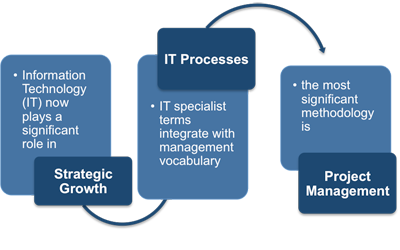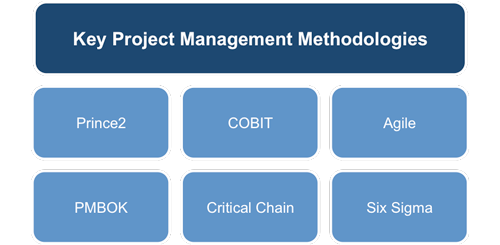Project Management Principles
The impact of technology and its influence on organizational processes is an essential aspect of any growth strategy. It is hard to find any development or procedural change that does not have an information technology aspect and in many cases it is actually the changes in available technology that drive the need to change organizational processes.
This has led to a merging of IT working practices into that of general management including the use of project management.
 |
Managers now find that they are frequently involved in projects that are being managed using a formalized project management methodology. Communications forms a key part of such projects and if you are going to be successful in your role as a manager it is essential that you have a thorough understanding of project management terminology, processes, and procedures.
There are various ways in which projects can be approached and a host of 'methodologies,' 'frameworks,' and 'processes' have been developed over the past 60 years or so. Some of these have their origins in academic research whereas others have grown out of proprietary methods developed by organizations that are highly project focused, for example management consultancies.
 |
Each of these project management methods has its own way of looking at projects and its own terminology for the documents and processes that make up project management. There has been some rationalization in recent years but there are still a dozen widely used methods. The ones you are most likely to encounter are PMBOK®, PRINCE2, Critical Chain, and Agile.
PMBOK® is short for Project Management Body of Knowledge, which describes project management practices that are common to 'most projects, most of the time.' The PMBOK® is published by the Project Management Institute (PMI), which was formed in the USA in 1969. The PMI also offers various levels of certification and the PMBOK® is widely used and respected.
PRINCE2 is a process-based approach for project management, providing an easily tailored and scalable methodology for the management of all types of projects. The method is the standard for public sector projects in the UK and is practiced worldwide. The acronym stands for Projects in a Controlled Environment and this is a project management program that shares more of the functional and financial authority with senior management, not just the project manager.
The Critical Chain method is not fundamentally different from the current mainstream approaches but it differs in the way that it handles risk and contingency. Developed in 1997 it is a method of planning and managing project execution designed to deal with uncertainties inherent in managing projects, while taking into consideration the limited availability of resources.
The Agile approach uses an iterative method of determining requirements for engineering and software development projects in a highly flexible and interactive manner. It is most often used in small-scale projects or in cases where the final deliverables are too complex for the customer to understand and specify before testing prototypes.
The project management eBooks on this website are for anyone who wants to find out more about a structured approach to project management. So much work is now run as projects and so few people have the necessary skills to manage them properly that there is a huge demand for good project managers and that demand is increasing all the time.
In summary, organizations are increasingly using project management techniques within their operations and the specialist language of project management has become more and more commonplace in managerial and executive meetings. This trend is here to stay and it means that managers need to be familiar with project management roles, terms and processes. Our free Project Management Principles eBook will help you to understand the principles of project management.
You may also be interested in:
Project Management Principles | Project Management Definition | Project Management Perspectives | Project Organization and Structure | Projects in a Matrix-Management Environment | Project Stakeholders Definition | Project Sponsor Definition | Project Life Cycle Definition | Functional Areas of Project Management.
|
|


